|
|
|
Sort Order |
|
|
|
Items / Page
|
|
|
|
|
|
|
| Srl | Item |
| 1 |
ID:
163869
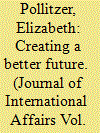

|
|
|
| 2 |
ID:
151415
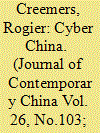

|
|
|
|
|
| Summary/Abstract |
The first two years of the Xi Jinping administration saw a thorough reconfiguration of Internet governance. This reconfiguration created a centralized and integrated institutional framework for information technologies, in support of an ambitious agenda to place digital technologies at the heart of propaganda, public opinion and social control work. Conversely, the autonomy and spontaneity of China’s online sphere was vastly reduced, as the leadership closed channels for public deliberation. This article reviews the institutional and regulatory changes that have taken place between 2012 and 2014, and analyses the methods and purposes of control they imply.
|
|
|
|
|
|
|
|
|
|
|
|
|
|
|
|
| 3 |
ID:
181140
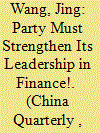

|
|
|
|
|
| Summary/Abstract |
This article examines the roles digital technologies have played in propelling the shifts in modes of financial governance which have been led by the Chinese Communist Party and enacted by a wide spectrum of regulative actors. Based on analyses of the laws, policies and regulations surrounding digital financial technologies, or so-called fintechs, as well as in-depth interviews with government officials and fintech business executives, I argue that the proliferation of fintechs challenged the existing regulatory schemes defined by the Central Bank and the State Council. This forced a reconsideration of the Chinese government's hegemonic strategies in governing the rapidly changing financial industries. While digital technologies have been promoted to accomplish the goals set by the Party for financial marketization and modernization, a set of institutions including regulatory, organizational and normative rules have been developed to strengthen the Party's control over the digitization of finance. This contradiction is pivotal to understanding the Party's financial policymaking in the digital age.
|
|
|
|
|
|
|
|
|
|
|
|
|
|
|
|
| 4 |
ID:
152735


|
|
|
|
|
| Summary/Abstract |
This collection of articles contributes to the growing body of research on how technology is affecting peacebuilding, peace and conflict studies, and research methodologies in the field. Assumptions about the use of technology for peace are interrogated, such as the purported deepening of inclusivity and widening of participation that technology provides to peacebuilders and communities. It frames the discussion from a peace-focused perspective, providing a response to the work done by others who have focused on the ways technology makes violence more likely. This supports a holistic discussion of the ways that technology can have an impact on contentious social and political processes. By expanding the base of knowledge about how technology can be used for peace and violence, we hope this collection increases the understanding of the circumstances under which technology amplifies peace.
|
|
|
|
|
|
|
|
|
|
|
|
|
|
|
|
| 5 |
ID:
092987
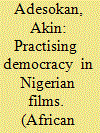

|
|
|
|
|
| Publication |
2009.
|
| Summary/Abstract |
This article discusses the response of 'Nollywood' to the transformation of Nigeria's social structure through the economic and political regimes of global neo-liberalism and Nigeria's military rule, and the aesthetic possibilities enabled by video and digital technologies. Approaching Nollywood as a new cinematic form which results from the collapse of the middle classes due to radical economic reforms, the article looks at two films, Akobi Gomina ('The Governor's Heir', 2002) and Agogo Eewo ('The Sacred Gong', 2002) to demonstrate the implications of this phenomenon in the changing socio-political structure crystallized with the advent of the Fourth Republic in 1999. In these works of explicit and oblique political commentary, which present us with intimations of the genre of 'democracy films', the idea of a public receptive to mutually recognized cultural or personal symbols is used to develop new aesthetic modes in films. But these film-making practices also circumscribe the possibilities of an ideologically progressive cinematic practice. Thus, a form originating partly from an economic context appears caught in an aesthetic impasse, but the article suggests that the tendency in Nollywood toward generic proliferation might represent one path out of the impasse.
|
|
|
|
|
|
|
|
|
|
|
|
|
|
|
|
| 6 |
ID:
185946
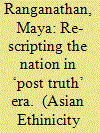

|
|
|
|
|
| Summary/Abstract |
This paper evaluates the ways in which new national narratives are sought to be constructed in ‘post-truth’ era – marked by what Harsin terms competing convictions, discord and confusion and attempts to manage the communication environment. New technologies and online spaces facilitate the ‘re-creation’ and ‘re-construction’ of the past and are co-opted in the nation building project. In the context of extensive studies on how the democratic potential of new technologies is subverted, this paper calls for specific attention to the ways in which (imprecise) history forms part of discursive nationalism in present times. Taking up India as a case study, the paper explores and evaluates the strategies employed in the rescripting of the national narrative potentially leading to new national memory.
|
|
|
|
|
|
|
|
|
|
|
|
|
|
|
|
| 7 |
ID:
183405
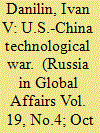

|
|
|
|
|
| Summary/Abstract |
The technological war, or Tech War, as part of the geopolitical conflict
between the United States and China raises a range of questions for
researchers, the most important one being the role of digital technologies
and markets in international relations and world politics. The article studies
the motives and objectives of the Tech War and its long-term effects using
available academic literature on sanctions and research data on the digital
economy and high-tech markets, including the political aspects of the
U.S.-China rivalry. Analogues from the Cold War and other conflicts suggest
that the economic purpose of the Tech War is to limit China’s capacity in the long term. However, the new realities transform both the instruments
and goals of the traditional superpowers’ economic withstanding. The
importance of information and communication technologies (ICT) and the
rise of the digital economy have made traditional geopolitical and market
(commercial) dimensions of the conflict intertwined with high technology
seen as a strategic resource and a separate area of conflict. As for the
role of digital technology in world politics, a reverse process is observed:
its importance is growing due to the traditional (geo)political factors,
including securitization of the digital sphere, enhanced by the narratives of
new technological revolutions. These factors increase the intensity of the
Tech War since competition in high-tech markets is perceived as a zero-sum
game. However, in the long term, the globalized, highly internationalized
nature of digital markets and technologies may lead to the normalization
of global processes and world politics.
|
|
|
|
|
|
|
|
|
|
|
|
|
|
|
|
|
|
|
|
|